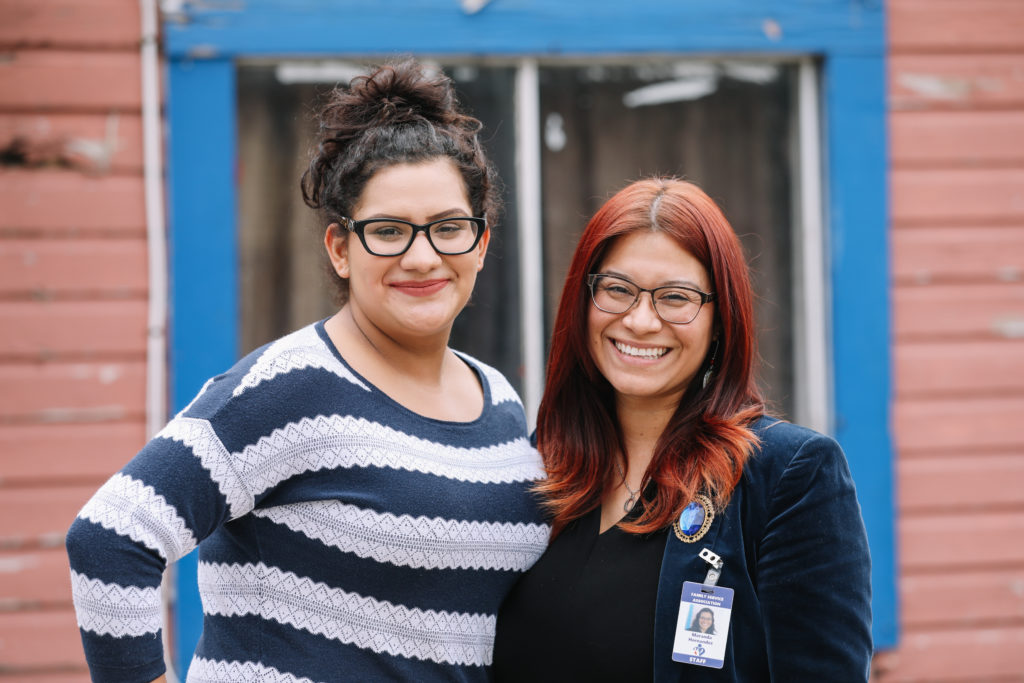In Maranda Hernandez’s work to end child abuse as a community health worker, she asks parents about their own childhood experiences. “With a lot of my families, we went back to ‘well, how were things for you when you were a kid?’” In this way, Maranda builds trust with the parents, shares her own story, and learns about herself along the way. “Every day there’s something new I learn from the families I’m teaching.”
Part of the Promotoras Child Abuse Prevention Program is to help identify adverse childhood experiences that place parents at greater risk of continuing cycles of neglect and abuse. More, Promotoras are friends and neighbors of the parents they serve, providing counseling, resources, and support to help end child abuse in their own communities.
Paul Cantu, 30, was the first program graduate. He was homeless and living at Haven for Hope when he heard about the opportunity. “I thought why not try something to broaden my horizons and better myself as a parent,” Paul said last fall, as his son, Paulie, sat on a sofa and played on a cell phone, kicking his Batman shoes while deep in concentration.
Maranda worked with Paul once a week for 18 weeks to complete the 160-hour curricula. Funded by the City of San Antonio, the program is a two year-pilot in Council District 5 and the result of a collaboration between Child Protective Services, Councilperson Shirley Gonzales’ Office, Family Service, and Voices for Children.
When Paul moved into an apartment outside of District 5, Maranda advocated for his continued enrollment. “I could tell he really wanted to finish,” she said, so she met Paul at parks near his home or drove with him to pick up Paulie, working hard to accommodate his schedule and fit in the lesson plans.
Promotoras learn to administer an adverse childhood experiences assessment, which asks parents to reflect on traumatic and stressful events from their own lives. Then, they tailor their lessons for parents accordingly. “[Parents] need to see role models in the community that have had the same experiences,” said Victoria Salas, director of the Neighborhood Place at Family Service Association.

Monica Lara and promotora Maranda Hernandez | Photo by Vanessa Velazquez
The community health worker model is more important than ever. Child abuse is occurring across San Antonio, and Bexar County is outpacing Texas statistics on the revictimization of children.
In 2015, we exceeded our 2020 goal for decreasing the number of confirmed child abuse cases. However, in a recent report, SA2020’s data partner, CI:Now, showed additional information that helped tell a more complex story of child abuse in San Antonio. In short, abuse and neglect are just as frequent as before, yet completed investigations are declining. It’s a story about the need for holistic solutions. With this understanding, Promotoras also ensure that families have access to food, medical care, and housing.
Early impacts of the work show promise. Paul said he would recommend the program to his friends because it helped him better understand his own childhood and Paulie. “It almost felt more like counseling, more than a class,” he said, adding that Maranda provided moral support when he shared the challenges he faces as a parent. The University of Texas at San Antonio has been charged with tracking the program, and will measure its success after its two-year run. For Victoria, the fact that the program is trusted in the community is evidence enough of its early success. “They’re referring their friends and family to the program, which says a lot.”

